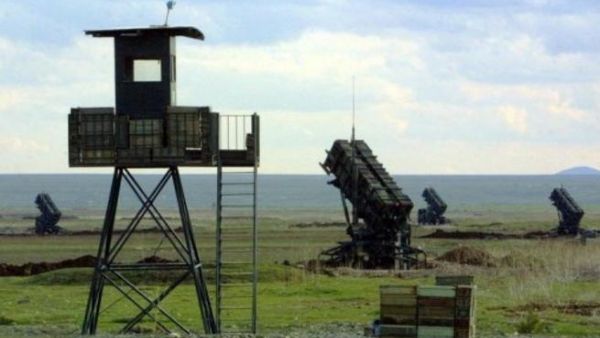Syrian government forces launched withering air and ground assaults against rebel positions on the outskirts of Damascus Friday, while anti-government forces targeted a military post near the capital with a car bomb, activists said.
The uptick of violence in the capital came as U.S. troops began arriving in Turkey to man Patriot missile batteries against threats from Syria, amid concerns the escalation in violence from Syria’s civil war would spill across the tense border.
Northeast of the capital, fighter-bombers hit Douma and artillery shelled the southwestern Daraya neighborhood, which rebels have held against regime assaults for weeks.
Troop reinforcements were being sent to Daraya, the British-based Syrian Observatory for Human Rights said.
Daraya has become one of the bloodiest battlefields in Syria’s civil war. In August, the district was the scene of the worst massacre of the conflict when more than 500 people were reportedly killed.
Al-Watan, a pro-regime newspaper, claimed that the army had “won the battle against the terrorists in Daraya and destroyed their last positions.”
It said that several members of the jihadist Nusra Front rebel group had been killed, wounded or surrendered and that Daraya should be fully secured later Friday.
As with many of the claimed victories put out by the regime or the rebels, there was no way of verifying the situation. Many of the supposed triumphs have later turned out to be empty boasts.
Assad’s regime routinely describes the insurgents as “terrorists,” claiming many are foreign and backed by money and arms from Gulf states and the West.
The rebels acknowledge a minority of foreign fighters in their ranks, but say their struggle is one of Syrians for a Syria free of President Bashar Assad. They reject any negotiations as long as Assad remains in power.
The latest offensive was being waged a day after a car bomb in the north Damascus neighborhood of Massaken Barzeh, mostly inhabited by members of Assad’s Alawite minority, killed at least 11 people, the Observatory said. Two children were among the dead, it said.
They were among at least 191 people who were killed Thursday, including 99 civilians, the Observatory said, adding that fighting around Damascus accounted for 87 of those deaths.
The Observatory added that a car bomb blew up outside a military intelligence building in the northern Damascus suburb of Nabk Friday but had no immediate word on casualties.
Nationwide Friday at least 27 people died – 16 civilians and 11 rebels – according to preliminary Observatory figures. Figures routinely rise dramatically overnight and have recently exceeded 150 on a near-daily basis.
In ongoing conflict in the north of the country rebels resumed a week-old offensive against regime-held airbases.
Activists said there were battles around the military air base of Taftanaz in the northern province of Idlib close to the Turkish border and near the international airport of Aleppo.
Fadi al-Yassin, an activist based in Idlib, said the rebels had killed Thursday the commander of Taftanaz air base, a brigadier general.
“The battles now are at the gates of the airport,” Yassin said via Skype. He added that it had become very difficult for the regime helicopters to take off and land at the base. He said warplanes taking off from airfields in the central province of Hama and the coastal region of Latakia were participating in attacking rebels around Taftanaz.
The Syrian Army General Command said troops directed “painful strikes” against the “armed terrorist groups” of the Nusra Front.
Aleppo airport has been closed since Monday. A government official in Damascus said the situation was relatively quiet around the facility, adding that it was up to civil aviation authorities to resume flights.
The conflict has worsened in the past six months as Assad has increasingly resorted to airpower to try to flush out the rebels.
The escalation in violence prompted the decision to deploy the NATO Patriot missiles along the Turkish-Syrian border in coming weeks. The next step in that deployment came Friday with the arrival of the U.S. personnel specialized in the six Patriot systems.
Cross-border fire has already erupted on several occasions in recent months from combatants in Syria into Turkey, Lebanon and the Israeli-occupied Golan Heights.
The U.S. military’s European Command said Friday that the troops being sent to Turkey’s Incirlik air base would swell to 400 within days to support the two U.S. Patriot batteries being supplied by America.
Germany and the Netherlands will supply the four other Patriot batteries under the NATO agreement struck at Turkey’s request and described as a purely defensive deployment.
“The forces will augment Turkey’s air defense capabilities and contribute to the de-escalation of the crisis along the Alliance’s border,” the EUCOM said.
A political resolution to the conflict now looks increasingly out of reach, with international powers at odds over intervention and deadlock over the role, if any, Assad could play in any transitional government.
Nonetheless, a top U.N official said Friday talks may resume next week between U.S. and Russian officials and the international envoy tasked with negotiating a peaceful solution to the conflict, Lakhdar Brahimi
The president of the U.N. Security Council Masood Khan told reporters Thursday that Brahimi was trying to pave the way for a diplomatic breakthrough and planned to follow up talks in Moscow last Saturday with Russian Foreign Minister Sergey Lavrov with new three-way talks.








